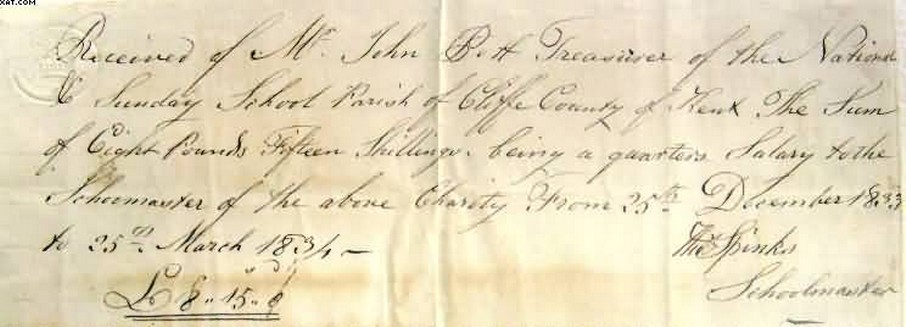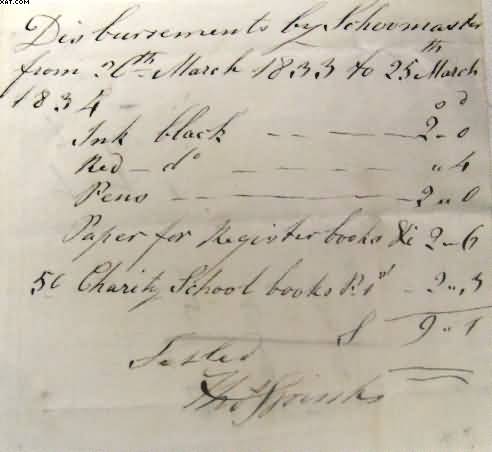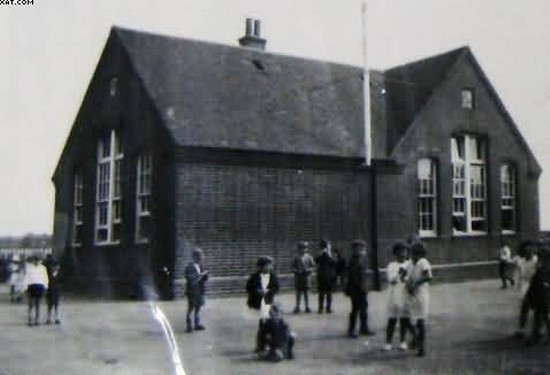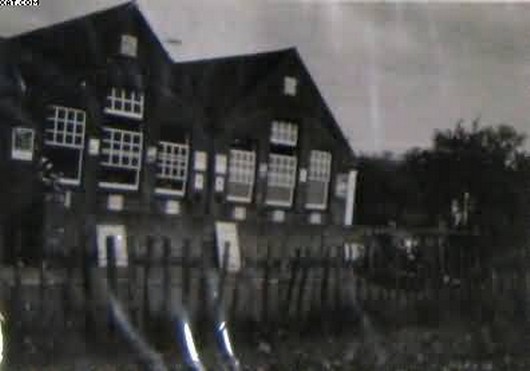Schools
“John Browne late of this parish yeoman, did by his last will of the 7th June 1679 give one tenement: lying in Church Street in ye tenure of John Browne, also one other tenement on messuage with th appurtenances lying in Southwood Burough in ye tenure of Tho. Plaistow. To and for the educating and teaching of 12 poore children, being the inhabitants of this parish forever. And that his executor and ye churchwardens of this parish for the tyme being should elect and choose a poore man or woman being capable to teach, as also the children to be taught and that the said premises should be, by the said master or dame kept in good repair.”
The school founded by John Browne may have been in the room above the church porch. It seems that the schoolmaster was indeed a “poore man” for entries in the churchwardens’ accounts for 1801 include “Gave the Schoolmaster in whant 4-“ and “Gave the Schoolmaster to go to Gravesend 8/-.”

This receipt from the church chest reveals that in 1833 Mr. Tho. Spinks, schoolmaster, received a salary of £8 – 15s every three months
The following bill also is interesting. The earliest part of the present school was built in 1854 by voluntary subscription. Twelve children on Browne’s Charity were getting freed schooling. Payment for the other scholars was 4d, 3d, or 2d a week according to the ability of the parents to pay. There was Night School on Mondays, Wednesdays and Fridays from 7 – 9 p.m. on payment of 3d weekly. “The School Pence” supplemented by local subscriptions and a government grant, paid the salaries of the Master, Mistress and Monitors. In 1868 the Rectors of Cliffe wrote that the day school was “very full with an average attendance of nearly 100%”, and because of the rapid increase in population owing to the erection of Cement and Pottery Works the school was enlarged in 1871 and again in 1879. In 1923 the three departments Boys, Girls and Infants were amalgamate with Mr S.C.Sibson as headmaster, at this period of time there were nine assistant teachers and well over three hundred children, in January 1948 the school became a Primary School, providing education for children up to eleven years of age, the older children now go off daily to Grammar and Technical Schools in Rochester and Gravesend, or to the modern Secondary School in Wainscott. The latest alterations have been the introduction of kitchen and canteen for the supply of hot mid-day meals for schoolchildren.

The school house in Church Street carries a tablet which reads “John Browne gave by will 1679, Rebuilt 1868.”A note in the Parish Almanack for that year gives the cost of rebuilding as £200.
Cliffe Council Temporary Infants School was opened on Dec. 4th 1905 with 59 children. It functioned where the Cliffe Temperance Club now stands until the permanent modern building dated 1910 was formally occupied on February 21st 1911. Cliffe Council Infants then became its official title. The oil lamps were replaced by electric lighting in January 1936. A flying bomb damaged the ceilings and most of the glass in July 1944, which event caused Cliffe to be recognised as an official government evacuation centre for school children. No children from the school went away publicly but three were taken privately by their parents under the Strood Rural District Scheme.


Owing to the fall in roll by September 1946 the usual staffing of Head mistress and one assistant was again allowed after this period.
The school meal service commenced on October 3rd 1949, food being brought from Cliffe V.P. (C) School daily by van.
Cooling Street School, providing accommodation for 120 children, was opened in January 1907 with a roll of 68 pupils, ranging in age from five years to fourteen years. It functioned as an all age school until 1926, when boys of 11 years and over were transferred to Cliffe School. Water sanitation was installed in 1935. In 1936 girls id 11+ years were also transferred to Cliffe. By now the roll had fallen to 20 when it became a one teacher school. The present day roll is 44 with Headteacher and one assistant. In 1947 a kitchen was built providing hot midday meals for staff and pupils.
